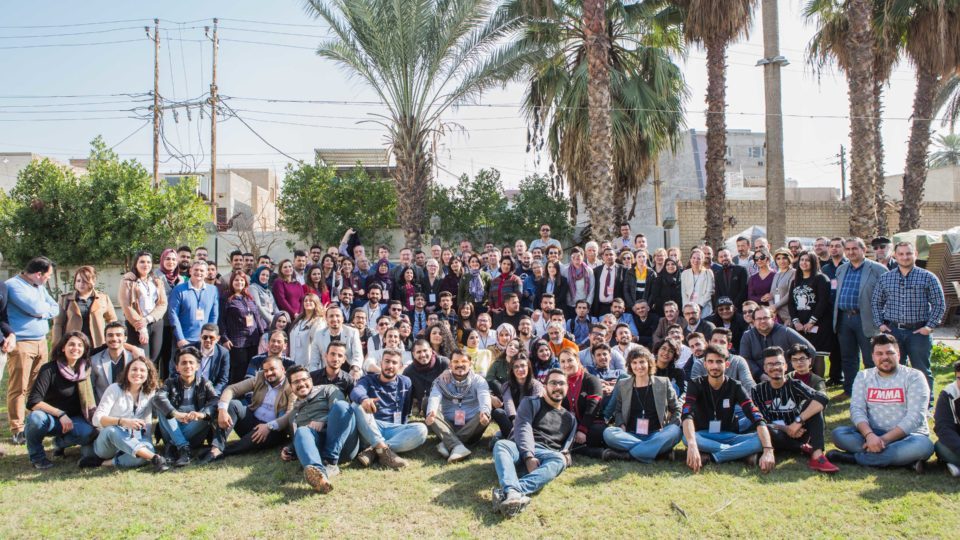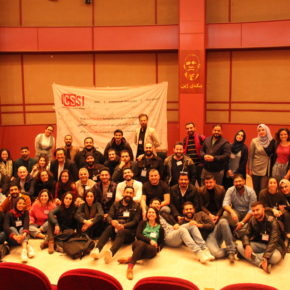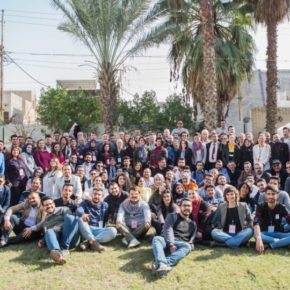Anniversary of the ICSSI Baghdad Conference of 2019
ICSSI Strategic Review Process: Listening to the Voices of our Partners.
Today, two years ago, the 28th of January 2019, the ICSSI was hosting its first Conference in Baghdad, and the tenth in its history. This occasion renewed our energies and will to work together, and since then we never stopped. This year, we want thus to celebrate the 2nd anniversary of the Conference, by sharing with our partners and readers the progress of a process we started few months ago: the ICSSI Strategic Review.
In 2014, the ICSSI adopted two fundamental documents: its Mission Statement and Internal Regulations. Since then, throughout our daily work, we developed our approaches, new campaigns, saw the Iraqi Social Forum consolidating and the Iraqi Civil Society context changing. We saw, indeed, Iraqi Civil Society growing, connecting, strengthening, October protest’s and women’s movements raising, nevertheless and throughout all the challenges that characterize the Iraqi social and political reality.
To be aware and clarify these new developments, and thus to be able to provide an even more systematic support to the Iraqi Civil Society, we decided to undertake the review of our fundamental documents. Moreover, we conceived this review as a participated process: an opportunity for us to gather our partners and highlight with them what are our values, our approaches, and, especially, the main challenges, both short and long-term issues of work, on which contemporary Iraqi civil society thinks we should give support.
In September 2020, we started this process by holding three Brainstorming Sessions, involving especially Iraqi partners, but also International ones who did not lose this occasion to show up their solidarity. In the covid-19 period, characterized by personal difficulties, continuous online meetings and hard work for civil society organizations, we want thus to thank our partners for letting us hear their voices, and, honoring the Baghdad’s ICSSI Conference memory, show them that these voices have not been lost: we took note and elaborated all their considerations to structurally include them in our identity and perspectives of work.
The first Brainstorming Session (15th October 2020) has been focused on ICSSI Identity and Values. In this occasion, we decided to define ourselves as “Solidarity Platform” and restated our approach to the Iraqi Civil Society, as we consider it wider that registered formal organizations, including informal voluntary groups, unions and social movements; We focused then, between the other things, our approach to solidarity, defining it as mutual and active, as it implies not only showing empathy, but undertaking concrete actions in support of our partners struggling for peace and human rights on the ground, creating concrete connections with and within Iraqi Civil society, both at the internal and at the international level; We defined then our fundamental principles of work in the sense of a participatory, bottom-up, gender-sensitive, ownership-based approach, identifying also the importance of undertaking a commitment to let the International NGOs that are working in Iraq understand the importance of hearing the Iraqi civil society voices and demands, as a basis for an effective and sustainable international cooperation.
The second Brainstorming session (19th November 2020) has been, very importantly, focused on the Iraqi Civil Society, to understand its recent development, the current main challenges, and the role ICSSI should play in this regard. Firstly, given its importance, we tackled the issue of the threats, attacks, arrests, and killings that Iraqi Human Rights Defenders and activists are facing both in Iraq, especially in liberated areas and in critical cities like Basra, and in the Kurdistan Region of Iraq. Given that freedom of expression and association in Iraq is under constant attack, from our Iraqi civil society partners emerged a huge demand to the International community to increase pressure on the Iraqi authorities, and give more support, also from a financial point of view, to Iraqi Civil Society organizations struggling for civil and political rights. Furthermore, in the meeting we ascertained the tiredness of Iraqi civil society of the international community coping with the critical threats Iraqis are facing only by releasing statements, raising consequently the issue of the International institutions’ weakness in front of the national government, and the need for effective, direct nonviolent and advocacy actions.
When looking at the Iraqi Civil Society, we should then pay maximum attention to the women and youth role, which is increasing since October’s protests started. Young and women activists are in need, indeed, from one hand, of economic support, since many are still forced to leave activism because they cannot make a living of it; on the other hand, they are also in need of receiving support to their capacity to build and conduct their programs and political organizations.
The request for international support is also valid regarding the economic and social rights. In front of the worsening economic crisis in the country, workers’ unions underlined the raising hunger and unemployment, identifying corruption as a fundamental factor to be considered as a priority, and the need to work in a purposeful way to develop alternative social and economic policies. This raised the demand to the International community to give support to Iraqi Civil Society in terms of capacity-building to conduct livelihood projects, while, in general, it was underlined that programs in Iraq should start to consider more the issue of promoting economic and social rights.
The issue of covid-19 crisis impact on Iraqi Civil Society was then tackled. In this regard, we focused especially to the increasing usage of online tools in civil society’s activities. From one side, this can be considered as a positive development for civil society discovering new means for connecting and communicating; but from the other, it determines the increasing importance of working on capacity-building in the field of digital security.
The entire set of these issues, were then specifically addressed in occasion of the third ICSSI Brainstorming session (17th December 2020), focused on the “Issues” on which ICSSI work has been dedicated in the past, and should be directed in the future. Here we addressed the importance of defining priority issues depending on the local contexts but identified at the same time the structural ones on which, in general, we must pay special attention. From this discussion emerged a huge field of action, ranging from Demilitarization, Peacebuilding and Reconciliation – addressing the issues of illegal arms trade of militias and informal groups, violent extremism, foreign inference – to Human Rights Defenders’, Women’s and Youth’s Power and Rights, Economic and Social Rights, the Environment and Cultural Heritage protection. One of the priority issues identified was then “Democracy”, which implies, in the mid-term, the work on the 2021 Iraqi Elections process observation, and in the long-term, working for civic and political freedoms and Iraqi institutions’ accountability.
To undertake the ICSSI work on all these different fields, systematic networking will be fundamental. It is important indeed that our partners will be willing to contact us to receive support, that we will take care of communicating and updating constantly with them, and mapping initiatives on the Iraqi territory. For this reason, it is also important to let the Iraqi civil society understand that there is no competition: instead, ICSSI exists as a support.
Our work for to build this systematic support will continue, within the ICSSI Focus Group on the Strategic Review, by reviewing our Internal Regulations and structure, taking into consideration how we build connections and maintain communications with our partners. After this phase, the hole process will be finalized within an ICSSI General Assembly reaching official ICSSI partners’ final observations and approval of the review as a collective product, resulting from our capacity to actively listening to each other.





